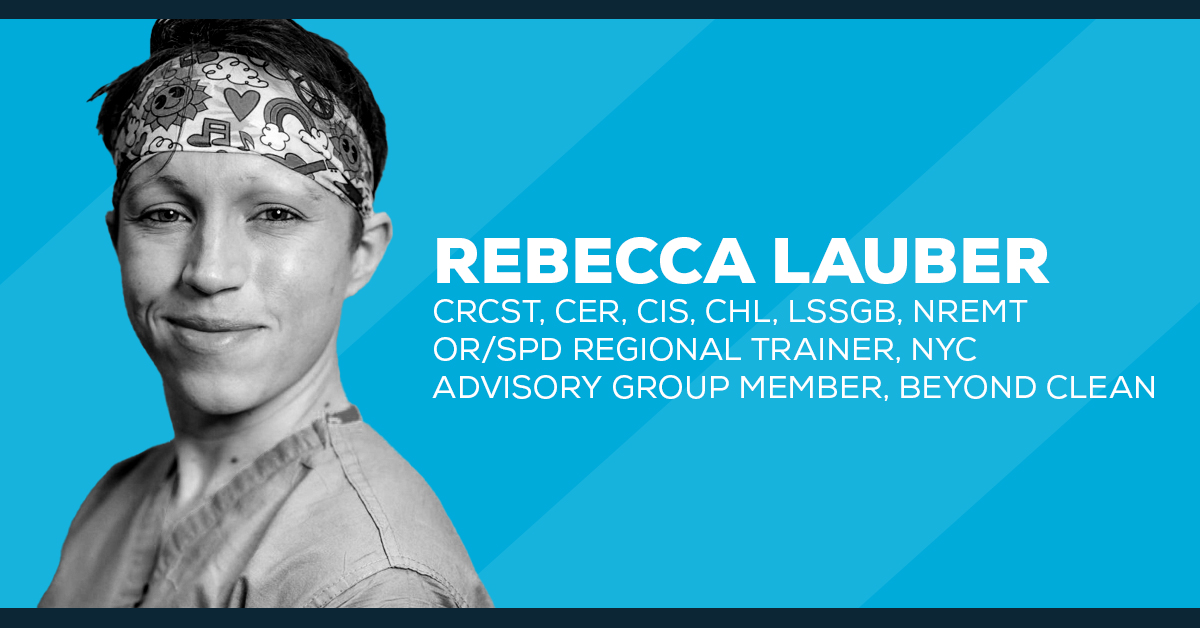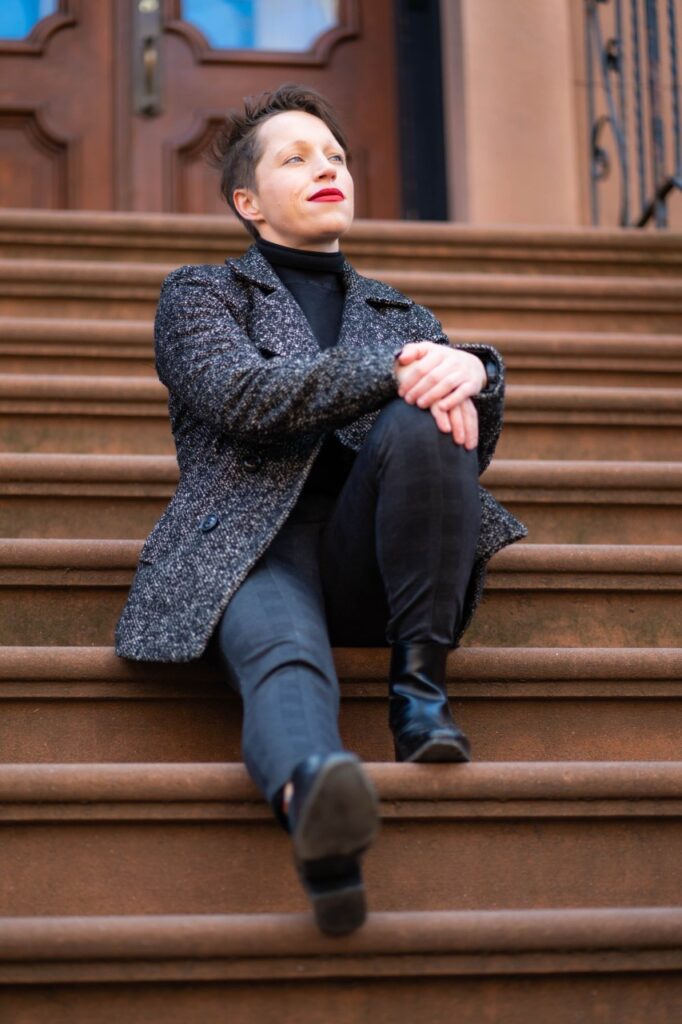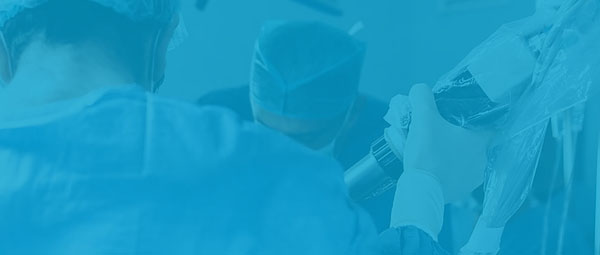
Rebecca Lauber envisions a brighter future in which healthcare workers have all the tools they need to help patients receive dignified, effective, and life-giving care, and she’s doing all she can to make it happen. Here’s how she does it.
New York City, New York – When it comes to improving America’s healthcare system, there are many ways to ignite change. While some people make change on an interpersonal level and others pursue structural goals such as policy changes, there are few who have experience in both.
Rebecca Lauber, CRCST, CER, CIS, CHL, LSSGB, NREMT, is one of those rare people.
Not only is Lauber an operating room (OR) and sterile processing department (SPD) regional trainer in the New York City area and an advisory group member for Beyond Clean, she has nearly 10 years of experience as a sterile processing technician and spent one year as an EMT. In addition to her on-the-ground work, she also seeks to enact change on a legislative level. To do so, she’s pursuing a Bachelor of Science in Health Policy and Administration at Penn State University.
“I’m committed to learning the system inside and out, not to accept it as it is, but to challenge what it could become,” wrote Lauber in a LinkedIn post.
In addition to her keen understanding of the industry as a technician and as a student, she’s all too familiar with the challenges and heartaches that patients go through. As someone who lives with a rare autoimmune disease, she’s experienced a lot of it firsthand.
Lauber has polyglandular autoimmune syndrome. Also known as APS-1, this syndrome is a multi-endocrine disorder in which the body attacks its own tissues.
“I see a lot of what the rare disease community goes through firsthand,” said Lauber. “I’ve personally been through a lot, and one of the main drivers of my work is I don’t want to see anyone go through what I have.”
For example, there is only one medication available on the market for Lauber’s disease. The other drug was discontinued. Because Lauber has such a severe case, she needed access to this particular drug. To get the medication she needed to save her life, she had to personally write three appeals. Without the medication, she would not be here today.
 Her experiences living with a rare disease, coupled with her years of experience in SPDs, ORs, classrooms, and emergency vehicles, have illuminated the many ways in which healthcare can improve to better meet the needs of patients. While she is currently working toward this goal as an SPD/OR trainer, with her degree, she hopes to enact change on a policy level.
Her experiences living with a rare disease, coupled with her years of experience in SPDs, ORs, classrooms, and emergency vehicles, have illuminated the many ways in which healthcare can improve to better meet the needs of patients. While she is currently working toward this goal as an SPD/OR trainer, with her degree, she hopes to enact change on a policy level.
Drawing on her vast experience, here are several of Lauber’s ideas and observations to promote a better future for healthcare.
A strong SPD makes for a strong hospital – All things go through sterile processing. So, a strong, organized, and efficient SPD sets everyone else up for success. “Sterile processing is the root of all operations in a hospital,” said Lauber. “By how efficient that system is, how effective it is, you can tell a lot about how the entire hospital runs.”
The entire system needs to shift towards preventative care – For Lauber, and for patients across the country, reactionary care doesn’t cut it. “We need to develop strong systems for patients to get the care they deserve before they end up in a dangerous situation,” said Lauber.
Access to food and water for all is non-negotiable – Along those same lines, preventative care involves a lot more than spotting the early signs of injury or disease. It starts with access to clean water and nutritious food.
“Preventative care is emotional and spiritual. It’s getting nutrition, food, or a glass of water,” said Lauber. “Since I work in New York City, when I see someone who is in need on the street, I will buy them meals. Sometimes people just need someone to talk to. You never know. One thing I’ve learned is these things are major contributors to one’s health.”
To take better care of patients, we need to start by taking care of healthcare workers – It’s simple: Depending on life changes, emotional variables, seasonal mental health effects and more, people are more primed to do a good job at work some days than they are others.
Lauber is a huge advocate for checking in on her team and meeting her colleagues where they are at to ensure not only their health, but the effectiveness of the job getting done.
“People go through things. It’s life. Sometimes all it takes is saying, ‘Hey, how are you doing today?’” said Lauber. “Maybe a colleague wants to be alone on a given day and just wants to dive into her work without speaking. That’s alright, I’ll put them on decontamination. Maybe they know they don’t have the focus to do a rigorous job. That’s also okay. I’ll put them on a different task. It’s all about meeting your team where they’re at.”
This also applies to providing safe and healthy working conditions for healthcare professionals. “Ultimately, if we’re not in a safe environment, then certainly our patients aren’t in a safe environment either,” said Lauber.
When met with limited resources, think outside the box – Not every hospital has access to the same resources. When Lauber encounters a hospital with limited resources, she doesn’t let it defeat her. Instead, she focuses on ways they can use what they have to advocate for something better.
For instance, one hospital she worked with recently had just one washer for robotic instruments. If and when that washer goes down, there is no longer a way to safely handle those instruments. So, before the problem ever happens, Lauber anticipates it and arrives at a solution.
In this case, she first tried to advocate for the hospital to invest in another washer. Unfortunately, that simply wasn’t in the budget. While the hospital had only one washer capable of reprocessing robotic instruments, Lauber suggested that upgrading the ultrasonic could serve as a valuable backup in the event of washer downtime.
She also established a ‘Plan C’, which involved taking all the necessary steps to be ready to reprocess at another location if both the washer and the ultrasonic were to fail.
“When you run into barriers, you just have to keep advocating for yourself through different channels until you get an answer that works for you and your department,” said Lauber.
Find the other change-makers around you – “We have a great group of technicians, educators, and more that are ready to take the torch and run with it and make sterile processing even better,” said Lauber. “It’s so exciting seeing so many people step up to the plate to improve our specialization.”
Ultimately, listen to SPD – “I’ve worked in multiple different hospitals,” said Lauber. “The thing that made the biggest difference in the success of a hospital is that sterile processing had a voice at the table.”
“The strongest hospitals have synchronization of perioperative care,” said Lauber. “When team members from all different, multi-disciplinary groups come together to fix the situation or a challenge, that makes all the difference.”
SterileBits: Do Your Best Work
To read more stories similar to this one, visit the blog on www.sterilebits.com and follow @SterileBits on LinkedIn.

